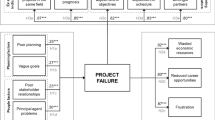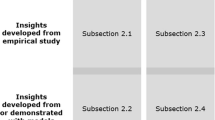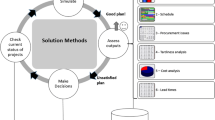Abstract
The paper considers two-stage game-theoretic models of the project management contract with a random duration of tasks. In the first stage, the Principal signs the contract for task execution in which he determines the amount and regime of payments to each of the contractors; in the second stage, the contractors choose their own work rates. The optimal amount of payments and the expected completion time of the project are estimated. The characteristics of the optimal contract for each payment regime are numerically simulated. In accordance with the comparative analysis of the simulation results, the project manager (Principal) benefits from choosing the contract with different payments for the contractors and the payment regime upon completion of tasks.











Similar content being viewed by others
Notes
PERT, Program Evaluation Review Technique.
References
Voropaev, V. I. Upravlenie proektami v Rossii (Project Management in Russia). (Alans, Moscow, 1995).
Lysakov, A. V. & Novikov, D. A. Dogovornye otnosheniya v upravlenii proektami (Contractual Relationships in Project Management). (Inst. Probl. Upravlen., Moscow, 2004).
Petrosyan, L. A., Zenkevich, N. A. & Shevkoplyas, E. V. Teoriya igr (Game Theory). (BKhV-Peterburg, St. Petersburg, 2012).
Spravochnik po spetsial’nym funktsiyam (Handbook of Special Functions), Abramovits,7D2M. and Stigan,7D2I., Eds., Moscow: Nauka, 1979.
Adler, P., Mandelbaum, A., Nguyen, V. & Schwerer, E. From Project to Process Management: An Empirical-Based Framework for Analyzing Product Development Time. Manage. Sci. 41(no. 3), 458–482 (1995).
Cohen, I., Mandelbaum, A. & Shtub, A. Multi-Project Scheduling and Control: A Project-Based Comparative Study of the Critical Chain Methodology and Some Alternatives. Project Manage. J. 35(no. 2), 39–50 (2004).
Kamburowski, J. An Upper Bound on the Expected Completion Time of PERT Networks. Eur. J. Operat. Res. 21(no. 2), 206–212 (1985).
Kulkarni, V. G. & Adlakha, V. G. Markov and Markov-Regenerative PERT Networks. Operat. Res. 34(no. 5), 769–781 (1986).
Kwon, H., Lippman, S., McCardle, K. & Tang, C. Project Management Contracts with Delayed Payments. Manufact. Service Operat. Manage. 12(no. 4), 692–707 (2010).
Maggott, J. & Skudlarski, K. Estimating the Mean Completion Time of PERT Networks with Exponentially Distributed Durations of Activities. Eur. J. Operat. Res. 71(no. 8), 70–79 (1993).
Paul, A. & Gutierrez, G. Simple Probability Models for Project Contract. Eur. J. Operat. Res. 165, 329–338 (2005).
Ross, S. Introduction to Stochastic Dynamic Programming. (Academic, New York, 1983).
Author information
Authors and Affiliations
Rights and permissions
About this article
Cite this article
Zenkevich, N., Sokolov, Y. & Fattakhova, M. Game-Theoretic Modeling of the Project Management Contract. Autom Remote Control 81, 2094–2107 (2020). https://doi.org/10.1134/S0005117920110107
Received:
Revised:
Accepted:
Published:
Issue Date:
DOI: https://doi.org/10.1134/S0005117920110107




